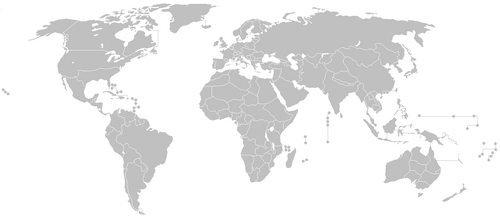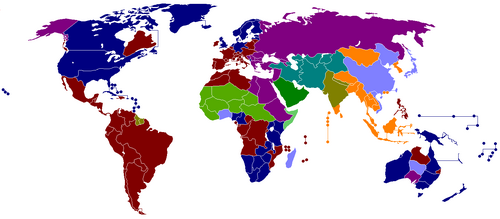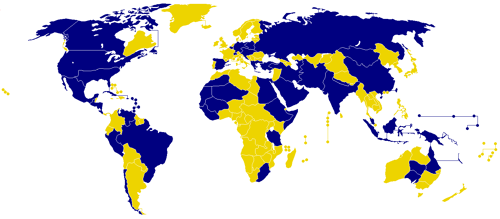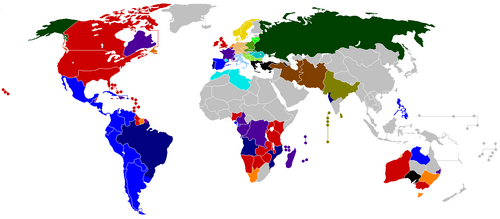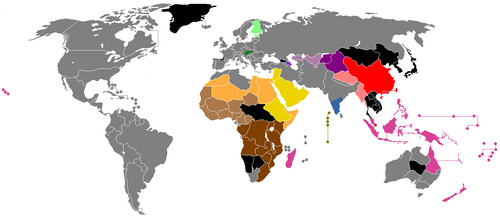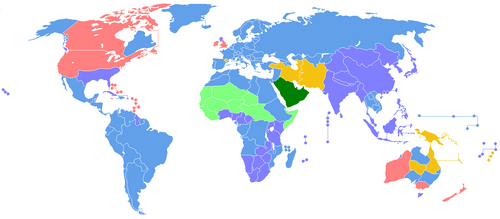| Announcement: Dear readers, contributors, and ex-contributors of Differently, it has been a pleasure being part of this community for so long. So many good memories were created while building this creative, rich and diverse timeline. Despite some quarrels here and there, the overall experience here has been very enriching. However, everything comes to an end. After over five years of Differently and twelve years contributing to this wiki, I have come to the conclusion that my IRL responsibilities have finally overtaken the time and energy dedicated to my online, non-profit activities. From now on, I consider myself "retired" from wiki editing. I may return sporadically to perform some edit or another or to engage with the community, but my prime time here is over.
Be wise and open-minded and uphold the values of this wonderful timeline we have built over the years. I entrust in the community and the committee the mission to revitalize this project that, despite its reduced activity, is not and will never be truly "dead" as some say, with its influence and impact echoing right now and for ages to come. Differently will never be dead. - Lnobse (talk) 14:47, 14 October 2023 (UTC) |
Differently is a project which combines the genres of alternate history and conworld. It is an alternate timeline with several points of divergence (PoDs), since ancient times up to the 21st century. One focus is the continuation of several states and cultures that came to an end in our timeline: Many countries resist foreign invasions that would change everything, others never lose land that they would lose, and others expand their territory. Other differences include World War II never happening, a distinct Cold War starting and ending earlier, Islamic terrorism never arising and Hitler becoming a thriving philosopher and mystic instead of a dictator (see more differences below).
Differently is work in progress. Since I'm not much experienced in developing ATLs, you're welcome to help me and suggest changes, especially if you notice something implausible or unlikely. I want to improve this project as much as possible.
As an open collaborative project, anyone is welcome here. If you want to contribute to this ATL, feel free to edit as long as the rules and guidelines below are followed. You can also join our Discord server to talk in real time with other contributors, but I'm currently unable to participate.
Contributors[]
You can also leave your name in the list of contributors if you want to:
Founder:
Committee of Four:
Other contributors:
- Nerdpics
- Icelandicwriters
- CheesyDolphins
- Kelothan
- Mister Duran
- KaiserFrederick2nd
- Mass
- Doraemon2000
- ThatDudeRightHere
- Testingdummynumber55
- Shroob12
- Cgl1999
- Nutthakorn sungson
- Angry Birds Forever
- Nostreamgia
- TheLearning Historian
- GuitarGod96
- WasabiOS
- Soilaf
- Georgepannell01
- Logomaster210
- Flabby cheeks for life
- VitLou
- KM005621
- Triton2009
- ThatAlternateHistoryLad5
- DudemanTheDude
- Withersoul 235
- Gustavo the Gamer 2023
- TheRealTaxiDriver
- SnowySahara :) Love the community :)
- DinoRickyYT
- Sevsdast
Rules and guidelines[]
We have only five golden rules:
- Be plausible. Think of what would happen realistically. Think of the butterflies (less obvious consequences of the PoD).
- Be consistent with the rest of the timeline. Respect what others have already created. Before jumping in, take a time to study the timeline and reflect how a PoD will affect the already existing world. The earlier the PoD, the more influential it is likely be, so be careful. There are certain things that are long established and should not be changed.
- No aliens, magic, or similar unrealistic stuff. This of course does not apply to plots of works of fiction within the timeline (example: Shrek! and many others).
- No alternative geographies. No fictional continents, fictional islands, or alternative climates (for example: the Sahara being a forest). The world's current physical geography and climate in this timeline is exactly the same as in our world. The fauna and flora, however, can be different (see dodo and panda).
No conversion of republics into monarchies or vice versa. This has already caused many problems so respect the established (see the map below).VETOED
The addition of even a single new sovereign state to the timeline would involve changing and reorganizing lots of pages, lists and maps for consistency, violating the second golden rule if not done. Changing territory in Differently is a long and tiresome process. For these reasons, the creation of new sovereign states is not done very often. This does not apply to dependencies or historical countries.
Besides the rules, there are also some guidelines and recommendations. They are not mandatory, but is preferable to follow them.
- Avoid clichés. I know clichés are tempting and I myself use some, but we want to make this timeline feel really unique and different, and repeating the same tropes over and over again is boring.
- Avoid bias of any kind (political, religious or otherwise). I know that it is impossible (or even boring) to be fully impartial sometimes, so it is not strictly prohibited, but do not abuse it so as to use the timeline as propaganda.
- Do not copy material from elsewhere. A classic example is copying an entire movie plot from Wikipedia and changing only a few names and lines - don't do that! Of course you can use real-world material as inspiration, but writing from scratch with your own words is always better. If this is ignored, the wiki may consider it plagiarism and both you and the timeline may suffer punishment!
Other characteristics of Differently:
- Freedom of creativity: So long as the rules and guidelines above are followed, new PODs can be created at any time. Use your imagination (and reason!) to explore an alternate scenario you wonder about. Differently is not only alternative history, but also worldbuilding.
- Illustration: Differently is a highly illustrated timeline. We use colorful images, including maps, flags and graphics, whenever possible. Of course, the pictures need to look reasonably good and realistic.
- Detail: In some aspects, Differently covers its alternate world in great detail. We have, for example, complete lists of countries by population and area, etc. But if details do not differ much from real life they don't need to be stated (see the copying guideline above).
Maps (present day)[]
See also: Historical maps

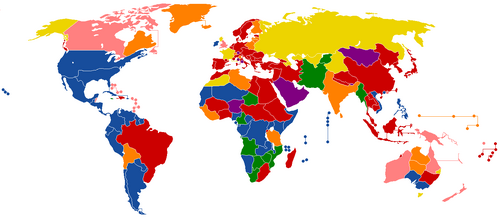
Forms of government
Democracies:
Timeline[]
A timeline with a brief description of some main PoDs.
Ancient and medieval history[]
- Prehistory: Paleo-Americans develop a belief that the mastodon is a sacred animal, which decreases its hunting and eventually results in its survival into recorded history.
- 33 BC: Having developed a much more modernized military and better relations, Ptolemaic Egypt deters the Roman plans of invasion. The later Christian influence in the country is smaller and the traditional religion is more prevalent.
- Another effect is that the Library of Alexandria is not destroyed and remains a center of wisdom until the Middle Ages.
- 610: Islam doesn't gain as much leverage as it does in OTL and gains a smaller number of supporters. The religion gets to dominate the Arabian peninsula but is not able to raise an army to conquer other lands successfully. However, later denominations of Islam called Alawite and Salehiyya enter Africa.
- 642: Rhomania and Egypt resist Arab invasions with an alliance. The Rashidun Caliphate, and consequently Islam, does not expand beyond the Arabian Peninsula and the Horn of Africa. Over the centuries, however, the Arabs exert an economic dominance over Persia and Europe, particularly Iberia, which also realizes cultural exchange with the Christian Berbers of northern Africa.
- Also, instead of an Islamic Golden Age, there is an Egyptian Golden Age, with the Library of Alexandria becoming this timeline's equivalent to the House of Wisdom in OTL. Many scientific terms that in OTL are from Arabic origin (like chemistry, algebra, etc.) are instead of Egyptian origin.
- 681: A remnant of the Roman province of Mauretania, Berber tribes take over the province and form the Berber Kingdom, taking the name Mauretania.
- 700: The Eastern Roman province of Carthāgō declares independence from Rhomania. Although not Punic in any way, the new nation of Carthage adopts many aspects of Punic life, including emblems.
- 1272: With a larger and stronger army, Rhomania resists the invasion by Charles I of Anjou, which would have formed Albania.
- 1352: The Zoroastrian-Christian conflicts start with the Zoroastrian Seljuk army threatening Constantinople. After pleading with the Roman Catholic church, a number of armies (crusades) are sent to relieve the attacks. These conflicts between Zoroastrian and Christian nations go on for over 150 years.
- 1365: After resisting centuries of raids by Slavic peoples, Macedonia is never conquered and remains part of Rhomania.
- 1452–53: The Battle of Constantinople during the winter is a turning point in favor of Christians in the Zoroastrian-Christian conflicts.
- 1498: Leonardo da Vinci is murdered before he begins to paint the Mona Lisa.
16th to 18th centuries[]
- 1502: The end of the Zoroastrian-Christian conflicts marks the traditional end of the Middle Ages. Due to deteriorating relations with Rhomania and the Silk Road being dominated by Zoroastrians, Western European powers still search alternate routes to Asia.
- 1503: The Duchy of Austria proclaims itself to be the Kingdom of Austria.
- 1516: Egypt is conquered by an expansionist Second Sassanid Empire.
- 1531: Austria and Hungary go to war with each other, resulting in the Habsburgs ruling Hungary and all the latter country's possessions.
- 1581: Ivan the terrible still assaulted his pregnant daughter-in-law but instead of murdering his son, Tsarevich Ivan, he committed suicide and the Rurikid dynasty continued to rule Russia until 1917.
- 1601: Byzantine explorer Eutropius Lascaris reaches the southern part of the Australian continent and claims it as part of the Byzantine Empire. European colonization of Australia officially begins.
- 1616: William Shakespeare doesn't die and subsequently comes out of retirement after three years. He writes ten more plays before dying in 1626.
- 1689-1690(1691): Riot of Bucharest, military conflicts in Wallachia against Habsburgs' monarchy
- 1690-1712(1715) -"War of independence of Moldova"
- 1692: The Salem witch trials come to an abrupt end after landowner John Proctor detonates eight gunpowder barrels under the floorboards of the courthouse.
- 1712: After centuries of political schism, the Second Sassanid Empire splits in two, forming the Empire of West Persia and the Afghan Kingdom of Persia (East Persia).
- 1783: Тhe emergence of an idea of the Roman revolution. Idea of Vlachia.
- 1790: The Great revolution in Mystras Australis
- 1792:
- After a revolutionary war, Haiti gains independence with Toussaint L'ouverture as the Emperor of Haiti. The new state controls all of the island of Hispaniola.
- An Orleanist coup in France leads to the establishment of the constitutional monarchy.
19th century[]
- 1803: Napoleon leads a coup against the Orleanist monarch, proclaiming the French Empire.
- 1814: Napoleon remains in Elba.
- 1815:
- The Italian Confederation is created by the Austrian Empire.
- The Republic of Venice is restored by Austria after pressure from its allies.
- 1828: Brazil wins the Cisplatine War.
- 1857: The Taiping rebellion ends.
- 1857-1859: The Sepoy Mutiny occurs. The Mughal Dynasty, the rulers of the Sublime State of Delhi, are overthrown and they and their vassal kingdom the Kingdom of Berar become Princely States of the British Raj.
- 1861-63: The U.S. is defeated by the South. The Confederate States of America are recognized as an independent country.
- 1864: Empress Cixi dies of tuberculosis, after which China undergoes a period of modernization and westernization, becoming a constitutional monarchy in the process. However this does not save the Qing Dynasty's reputation as rulers of the Han Chinese population.
- 1867: Alaska is not purchased by the U.S. An earlier offer to the Prince of Liechtenstein is accepted, but the Prince only buys the island of Johann (OTL: Prince of Wales Island), so the country of Johannia is formed and the rest of Alaska remains a part of Russia.
- 1876: German chemist and biologist Gregor Mendel invents the first immortalized human cell line out of one of his patient's cells, proving heavily influential in medical research and paving the way for more advancements.
- 1882: British forces invade Sassanid Egypt and Syria and liberate the two countries, which become free states once again. The ancient Hasmonean Dynasty takes over Syria and rule it to this day.
- 1883: Bolivia wins the War of the Pacific.
- 1885: Britain wins the Third Anglo-Burmese War and conquers all of Burma. Thibaw Min is ousted and replaced by his paternal nephew born from his half-brother Prince Nyaungyan who rules Burma as a Princely State of Britain.
- 1889: Instead of a full-republican takeover, a failed Republican Insurrection results in the Brazilian monarchy never being abolished.
- Late 19th century: China loses Tibet, Xinjiang, Hong Kong, and Macau, but later regains the former two.
20th century[]
- 1900s: Due to the Moroccan Crisis never happening, hostile relations in OTL between France and Germany never happen, which results in the peaceful transition of Alsace-Lorraine in 1909 from Germany to France.
- 1910:
- The Portuguese monarchy is not abolished.
- Japan does not invade Korea; a modernized China defends Korea from Japan, so the Korean Empire survives.
- The RMS Lusitania sinks by a rouge wave which caused the ship to do a V-Break, Killing 1,701 people.
- 1911: The RMS Olympic sinks after colliding with a warship. Approximately 1,864 people die.
- 1912:
- The Manchu Qing dynasty in China is replaced by the ethnic Han Chinese Xian dynasty.
- The RMS Titanic does not sink thanks to improved safety measures learned the year before.
- 1914: Byzantine heir George, Prince of Constantinople is killed by a Serbian nationalist. A diplomatic crisis breaks out between Rhomania and Serbia, which set the dominoes to the Great War. Austria-Hungary (later known as Danubia) does not join the Great War. Instead, it cedes territory to neighboring nations through agreements.
- 1918:
- After the end of the Great War, Germany becomes a democratic constitutional monarchy (instead of a republic) and gives independence to all its colonies.
- The three Baltic nations (Estonia, Latvia, and Lithuania) each achieve a brief independence from the Russian Empire before being annexed by the Soviet Union four years later.
- 1920s: The Arabs in the Arabian Peninsula rebel against the British Empire, engage in a civil war and form a unified and independent Islamic nation.
- 1921: Mongolia (with Inner Mongolia) officially becomes independent from China after almost a decade-long War of Independence.
- 1924: East Persia falls to a socialist regime, which lasts until 1975.
- 1926:
- With Britain's defeat in the Anglo-American War, Quebec, Hawaii and other states formerly controlled by the British become independent.
- The imperial democracy in China collapses. Independence movements in Tibet and the Uyghur regions start.
- 1927: British decolonization in India commences. Princely States of the British are abolished as the Azad Hind turns a majority of India into republics while princely states whom the Azad Hind fails to depose become independent kingdoms.
- 1928: The Kingdom of Tibet, the First East Turkestan Republic, the Hainan Clique, and the Northern Qing (later known as Manchuria) break free from China, establishing their independent nations.
- 1930s: Instead of a Nazi party, a Pan-Germanic Party, which uses a planned language called Teedish, rises in Germany. Instead of political and military power, Hitler seeks the cultural integration of Germanic countries and initiates a cultural movement. Anton Drexler and Heinrich Himmler are involved. Hitler becomes a philosopher and starts a movement called Hitlerism. He spreads Vanatru, a form of Nordic neopaganism, throughout the Germanic world.
- 1931: Japan's monarchy is ousted by communists who despised the monarchy for Japan's humiliating defeats to China and the US. The Communist Regime rules all the way to 1975.
- 1933: Artificial intelligence is created two decades earlier in England, as opposed to during the 1950s in the United States. Its groundbreaking abilities are demonstrated in a short called The Abilities And Benefits of Artificial Intelligence through a game of chess with Albert Einstein. The technology is successful, and is mainly used in factories and other places of work as automated machines (except for military equipment and other pieces of technology) into present day, not becoming mainstream until the 80s and 90s with the introduction of AI generated text and, eventually, imagery in the early-2000s and chatbots (like Cleverbot) in the mid-2000s. In other words, artificial intelligence is slightly more advanced, but still suffers from the same controversy and issues in this piece technology's modern era, during the 2000s and 2010s.
- 1935: In a groundbreaking medical discovery, 22-year old Soviet virologist Viktor Zhdanov manages to find an experimental dose to treat, and effectively cure intestinal cancer.
- 1937: Amelia Earhart successfully circumnavigates the globe and never winds up dead in the Pacific Ocean at the young age of 39. Unfortunately, Amelia Earhart would be forced to retire from aviation in 1941, after a serious and unexpected explosion occures while grounded in Texas to repair her Lockheed Model 10 Electra's left propeller. The accident seriously damages both her eyes for a brief period of time and leads to the near removal of her eyes before signs of recovery are miraculously shown, being treated to an extent at a hospital nearby. While recovering for a five years as a stay-at-home mother, Earhart has two children and lives in San Francisco as a lawyer, where many still praise and remember her mark on history, all the way up until her passing at the advanced age of 105 in 2002 of old age, mostly taking everything slow paced in her later years and making an appropriate number of public appearances for charity events, exhibit openings in her honor and other events.
- 1940: Germany declares war on Poland to get access to Danzig. Since this violates the Treaty of Versailles, Britain, Italy, and France interfere. This Polish-German War shapes both countries' today borders and Konigsburg becomes part of Poland.
- 1941: Italy fights a war against a coalition of Britain, France, Egypt and Rhomania, losing all its colonial possessions. Despite the loss of a war, the Italian monarchy is retained.
- 1947: After tensions between Vlachia and the Soviet Union, the latter country invades and establishes a puppet state.
- 1948: Burma gains independence and becomes a republic.
- 1951:
- An East Persian-planned republican revolution in West Persia fails, turning the tide of the Cold War, with West Persia siding with America.
- The Peruvian Communist Insurrection starts, which is the second-most important war that resulted in the fall of the socialist bloc.
- 1955:
- A violent Jamaican Revolution results in the full independence of Jamaica under a one-party Marxist-Leninist state. To this day, Jamaica is the only communist nation remaining in the world.
- The Polynesian Union is formed.
- 1960: Motivated by the Jamaican revolution in 1955 that only increased violence in the western African region, the Igbo people finally get their independence and name their newly founded country Biafra.
- 1961:
- Due to the Peruvian Communist Insurrection, the war triggers the first attempt of a nuclear explosion. DEFCON is raised to 2 for the first time ever.
- Ringo Starr doesn't leave the Hurricanes, remaining a prominent drummer in the band.
- 1965: Instead of a republic, Singapore is expelled from Malaysia as a monarchy.
- 1966: Tensions rise between the African nations of Biafra and Sokoto and they engage in border skirmishes.
- 1967:
- After months of tension between the two nations, hostilities break out between Biafra and Sokoto, with Sokoto militia men crossing over the Biafran border, and Biafra responding with regular army units which open's fire on the Sokoto militias, leading to high casualties and breaks out into full-scale war.
- Ringo Starr dies while the Hurricanes are touring the United States.
- 1968: Martin Luther King Jr. doesn't get assassinated. Instead, it was Jesse Jackson who died after he took the bullet for him.
- 1970: During the Luna 17 space mission, module Soyuz-VX successfully lands on the Moon. Cosmonauts Georgy Dobrovolsky and Vladimir Shatalov become the first humans to step on another astronomical body. The ENAASA's (European-North American Aeronautics and Space Administration, comprising of Canada, America and some European countries) Sea Dragon 4, which is originally intended to reach the Moon first, is delayed by three months and is sent back to the shores of Cornwall to HMNB Devonport for repairs, eventually launching on the night of 13 March 1970 with a three man crew which consisted of the following: Buzz Aldrin (1930-present), John Hemming (1929-2008) and Roger Chaffee (1935-2018). America and their partner countries would be beaten to Mars four years later in 1974 (this time by the Germans), with America landing there in 1975.
- 1973:
- South Vietnam wins the Vietnam War with help from China. Vietnam is united under the Republic of Vietnam.
- AC/DC never forms since the Young brothers don't go to Australia (in this timeline known as Swania) due to altered living conditions in their native Scotland, and most of their songs never exist or are completely different songs from other groups, with an entirely different sound and alternate lyrics. Prime examples of AC/DC songs being written by other bands include the Black Fist's "Black" (Back in Black in our timeline) from 1990 and Metallica's "Thunderstruck" from 1984, all of which have alternate lyrics and an alternate sound depending on the genre of the band or artist. The same things go for the songs by the Gorillaz, who never meet in the early 90s, with "Ghost Train" being a Willie Nelson song (country and jazz) from 1992, ''Feel Good Inc.'' being an Oasis song (Britpop) from 1997 and "Clint Eastwood" being an N.W.A. song (West Coast hip-hop) from 2002.
- 1974:
- The Abyssinian Empire is not abolished due to the steady collapse of communism.
- Many Eastern European communist regimes are overthrown by people's liberation armies. The interim republics of Vlachia, Bulgaria, and Serbia restore their monarchies after referendums.
- The Germanic League lands a man on Mars (four years after a manned Lunar landing) for an international project called I.G.M.M.E. (International Germanic Manned Mars Expedition), which has already launched temporary components from South America from 1971-1973 and lands a crew of two Italians, one Russian, two Britons and two Germans. A 25 year old named Jürgen Stefan becomes the first human in history being to ever set foot on Mars. The Soviet N-1-MEV (Martian Excursion Vehicle) module carrying the crew of seven lands successfully on the surface.
- The first Eurovision Song Contest is held in Lausanne, Switzerland rather than in 1956.
- 1975: The Moldovan Civil War starts.
- 1976: After nine grueling and bloody years of war, a ceasefire is declared between Biafra and Sokoto, ending the Niger Border War. A peace referendum is held in Thebes, Egypt by the League of Nations, with both sides declaring themselves as victor, even though most see Biafra as the victor, seeing that they pushed the Sokoto militias back, crossed the Sokoto border and captured towns and villages, and were 32 km from the capital.
- 1977: The Confederate Hurricane Center merges with the National Hurricane Agency of the USA, which starts the Atlantic hurricane naming scheme 27 years later than in OTL.
- 1980: John Lennon is not killed outside of the Dakota in New York City, as Mark David Chapman had been institutionalized days earlier after making a similar but unsuccessful attempt on Janis Joplin's life.
- 1981: A large, German-led musical revolution akin to the British Invasion takes place in the Western world, having a substantial influence on the development of modern music.
- 1982:
- The Soviet Union collapses, after which Ukraine, Belarus and Kazakhstan do not become independent republics, but autonomous republics within Russia. Borders in Central Asia are determined by geographical lines, not artificial borders.
- Cliff Burton never joins Metallica and remains a member of Trauma, as they never appear at one of his band's shows and decide to keep Ron McGovney. The two groups become rivals for fourteen years after some conflict having to do with the subjects of plagiarism and popularity. Trauma becomes a legendary and memorable death metal and Confederate metal band behind trash bands Metallica. Trauma never decides to go on a hiatus in 1985 and eventually become inductees to the Rock and Roll Hall of Fame. Jason Newsted is recruited to join Trauma in 1990, the group drifting towards death metal and the Southern music genre known as Confederate metal. Cliff and Jason create the record label Trauma Records in early 1994 after the major success of their 1993 album Awakening, as a way to further compete with Metallica after releasing Countdown to Extinction in 1992, produced by James Hetfield and Dave Mustaine of Megadeth.
- 1988: Matt Groening's The Simpsons is picked up to be a television series a year earlier and is still animated by Klasky-Csupo (who done some animation work for the Tracy Ullman shorts along side Matt), and is aired on Fox in October of 1988. However, the show doesn't have the same effect it had on pop culture in real life, and is forced into cancelation after it begins to decline in popularity and concludes due to both lower ratings than before and creative control. The show garners the pop culture status it should've received by the mid-90s, with multiple attempts to revive The Simpsons being scrapped. Also, because of the series' rough rise to the top by the 90s, Futurama is never created nor considered a series. However, the series inspires Mike Judge and Greg Daniels to co-create King of the Hill, an adult animated slice of life sitcom which is set in the Confederate state of Texas and is a satirical take on Confederate life, which debuts in January 1997 and enjoys a thirteen season run until October 2009, with a revival set to come in 2025 on Blockbuster, the rights having been sold from Fox.
- 1991: The Moldovan Civil War comes to an end. King Michael I of Vlachia becomes the Head of State of Moldova.
- 1994: Ayrton Senna does not have his accident at the San Marino Grand Prix and goes on to become the third driver to reach 5 titles in Formula.
- 1995: Selena is not killed in Texas as Yolanda Saldívar turned the gun on herself.
- 1996: The Zoroastrian terrorist group Faherohar takes over East Persia and establishes the first Faherohar regime.
21st century[]
- 2000:
- Since Chris Farley doesn't pass away in 1997, the film Shrek (whose title retains the book's original exclamation: Shrek!) is released a year earlier in 2000 to mixed praise from critics.
- Justin Pierce doesn't commit suicide and eventually becomes popular after playing Chad Channing in the Nirvana biopic Come As You Are, retiring from acting in 2011 and becoming a skater and a sponsor for Supreme.
- 2001:
- Since Islamic terrorism never emerges, 9/11 does not happen. The World Trade Center is never attacked and still exists to this day.
- The Faherohar is defeated in East Persia.
- George Harrison does not die from cancer, having avoided a stabbing attack two years earlier that brought about its return.
- 2002: East Timor (Timor-Leste) does not get independence from Malaysia (OTL: Indonesia).
- 2003:
- Steve Jobs agrees to be operated and survives his cancer.
- Actress Alicia Silverstone, best known for her role as Cher Horowitz in 1995's Clueless, dies on December 20th, 2003, as a result of a fatal seizure induced by a head injury from the previous evening, aged 27. Her death, paired with the sexual assault allegations of her Clueless co-star Leonardo DiCaprio (who played Elton Tiscia in the same film) from earlier that same year, kicked off a phenomenon coined by the media known as "the Clueless curse", in which individuals directly involved in the production of that film either die tragically at premature ages or get involved in an unfortunate controversial act that cements their fall from public grace.
- 2005: Joe Ranft never parishes in a car accident and continues to work in the animation business.
- 2008:
- The monarchy of Nepal is not abolished.
- Bhutan remains an absolute monarchy.
- The 2008 Rice Riots in China leave their economy in ruins.
- 2011: The famous American rock band Nirvana retires as a group and continues work on their own projects after 24 years, as Kurt Cobain never meets Courtney Love nor commits suicide in 1994, rather taking his time in rehab and struggling but not losing hope again.
- 2012:
- In the luckiest incident in maritime history, the Costa Concordia runs into rocks off the coast of Island of Giglio but does not sink and sails to Genoa.
- Seth Rogen is elected to the 11th seat of the House of Commons, never becoming an actor and comedian in the 90s. He is mainly focused on supporting poor Jewish households in Canada and working from home to 3D print fidgets for his business, Trinkit, founded in 2019.
- 2013: Instead of creating videos, Razzle is a punk rock band formed in 2013.
- 2014:
- 2015: The last member of the Himmeldorf experiment, Wolfgang Oppenheimer, passes away of Alzheimers disease on Christmas Eve at 110 years of age, having had a healthy vegetable/plant based diet since moving to Canada in 1970, becoming an author and residing in a farmhouse the rest of his days.
- 2016: Malaysia votes to leave the Australian Union.
- 2017: The 2017 hantavirus pandemic affects much of the world.
- 2020: Since China is not a dictatorship and did not censor early information about the disease, the COVID-19 pandemic does not happen. Furthermore, lessons learned from the hantavirus pandemic, including the need for early detection also are a big reason why COVID-19 does not become a pandemic, especially since the hantavirus pandemic began in China.
- 2021:
- The Kenyan Civil War comes to an end with the ruling government being overthrown.
- After a referendum, Moldova is officially reunited with Vlachia.
- The Faherohar fully takes over East Persia again.
- 2022: The Middle Eastern War and Great African War begin.
- 2023: The Great African War ends. The Indian Union is replaced by a federalized Indian Confederation, marking the first time in nearly 100 years that a unified Indian state exists. This rejoices the Indian populace, resulting in a Renaissance-styled evolution for the nation.
Other major differences in the modern world[]
- The current world is much more polycentric. There are multiple great powers everywhere instead of one or two world superpowers.
- Since the Space Race is more intense and lasts until 1983, spacefaring and astronomy are more advanced by the late 1960s. We know slightly more about the universe and our spaceships and astronauts can go farther, colonizing the Moon by 1981 and Mars and its two moons by 2023, after years of constant research and visits since 1974.
- Constitutional monarchies are more prevalent and many consider it a model system. Also many monarchies continue to practice male preference or agnatic succession.
- Outside of the United States and a few other nations, the world is more conservative with a strong emphasis on culture, religion, family, national identity and innovation. A majority of people on the planet belong to a religion as a result.
- Since Nazism never emerges, the Swastika is a commonplace symbol, widely used by companies, organizations, etc.
- Also because of Nazism's absence, many racialist and eugenic worldviews persist in philosophy and politics with much less judgement. They compete with opposing egalitarian theories, among others. The world has a plethora of different ideologies and worldviews, which began to grow particularly after the Himmeldorf experiment.
- Without 9/11 and Islamic terrorism, Islam is not a stigmatized religion in the West. Due to its much smaller prevalence, however, it is seen as a distant and rather unfamiliar Abrahamic religion. Western stigma is more towards Zoroastrians instead, but not to the same point of OTL stigma towards Islam.
- Famous people who are still alive or survive longer include:
- Chris Farley
- Steve Jobs
- Bruce Lee
- James Dean
- Robin Williams
- Amelia Earhart
- Marilyn Monroe
- Judy Garland
- Kurt Cobain
- Ayrton Senna
- Heath Ledger
- Brittany Bertolotti (known as Brittany Murphy in OTL, but in the Differently timeline, retained her father's last name)
- Tom Petty
- Eddie Cochran
- Justin Pierce
- Others
- Likewise, on the other hand, other famous people who are still alive or at least live longer in OTL die either prematurely or sooner in the Differently timeline (alongside explanations of their deaths), such as:
- Lindsay Lohan - Died in a car crash on November 30th, 2013, aged 27, similarly to Paul Walker's death in OTL on that exact same date (November 30th, 2013) and under the same circumstances (car crash). Due to Walker still being alive in the Differently timeline, Lohan's death in the Differently timeline is treated as the Differently equivalent to Paul Walker's death in OTL on November 30th, 2013, in a car crash, aged 40.
- Ben Stiller - Died on July 20th, 2014, aged 48, from prostate cancer (after having been diagnosed with it only a month prior, as While We're Young and Night at the Museum: Secret of the Tomb are both released posthumously and are dedicated to his memory. Stiller is the first member of the "Frat Pack" to pass away, and he was outlived by his parents Anne Meara (who later died in 2015) and Jerry Stiller (who later died in 2020).
- Demi Lovato - Died on July 25th, 2018 from a fatal drug overdose, aged 25.
- Paul Rudd - Died on September 25th, 2023, aged 54, from a sudden heart attack, likely caused by years of drug use which would have weakened his heart, and also being the second member of the "Frat Pack" to pass away after Ben Stiller. According to his wife and widow Julie Yeager, Rudd was a known drug addict since 2004, having finally let go of his drug addiction in 2017, which she determines might have had something to do with his fatal heart attack, believing that the drugs he took might have weakened his heart. At the time of his passing, Rudd was known for both his comedic and dramatic roles.
- Lana Del Rey - Born as Elizabeth Woolridge Grant, the singer, known for her ethereal vocals and melancholic and haunting musical style, died on April 25th, 2021, aged 35, having been found dead from suicide by stabbing in her apartment in her native Manhattan.
- Will Smith - Died in a fatal car accident on June 3rd, 2021, aged 52.
- Hayley Williams - The singer, best known as Paramore's lead vocalist, committed suicide by gunshot on January 27, 2016, aged 27.
- Melanie Lynskey - The rising young New Zealand actress, whose career was promisingly peaking at the time of her death, was found dead at her Los Angeles home on February 14th, 2005, aged 27. Her cause of death was determined to be from complications of anorexia nervosa, which started when Lynskey was only twelve.
- Others
- Likewise, on the other hand, other famous people who are still alive or at least live longer in OTL die either prematurely or sooner in the Differently timeline (alongside explanations of their deaths), such as:
- Linux is the most widely used desktop operating system instead of Microsoft Windows, which was defeated in the "OS wars" of the 1990s.
- Web browsers are different. Netscape maintains its dominance over the web browser market to the present day, as Internet Explorer will never gain the popularity it had in the late 90s and early 2000s as it did in OTL as Microsoft lost the OS Wars, which means that Firefox wouldn't exist either. Microsoft Edge will also never exist as it is the successor to Internet Explorer in OTL. Google Chrome will never exist either, as Google is purchased by Yahoo!.
- Video games are different. The PlayStation, for example, is a joint creation of Nintendo and Sony. Another example of the video game world here is the Grand Theft Auto franchise having a few more games in the series and a few additions (Grand Theft Auto's III, Biscayne and San Andreas) on the PS2 and original Xbox having better graphics and a slower paced development time because of this, having better sound quality, larger in-game maps and improved character movements.
- Certain individuals such as Peter Dinklage (dwarfism in OTL), Stevie Wonder (blindness in OTL) and others do not suffer with the physical or mental disorders they have in OTL. A side from disabilities, certain celebrities don't change their physical looks, an example of this being Sylvester Stallone, who never suffers facial nerve damage nor does he have plastic surgery procedures.
- Grunge remains relevant until 2007-2008 (even though it is already obscure at that point and ages rather poorly around 2004 or 2005, in favor of alternative rock and other genres) with Kurt Cobain, Stone Sour and Nirvana still being around longer than in our universe. Aside from that, rap remains underground until the release of N.W.A.'s 8th and last album Order, Order in 2002. Most rappers are pursuing alternate career paths for multiple reasons, thus leading to rap remaining an underground genre. Aside from that, Tupac and Biggie, though, are one of the few mainstream rap/hip-hop artists, since rock and country are still the top genres until the 2000s and 2010s. Another reason for this is the survival of grunge music.
- Almost every Indianapolis 500 winner is different than in our world. Drivers such as Marco Andretti and Oriol Servia become Indianapolis 500 winners.
- Names otherwise used in our world for television brands, musical groups, or other forms of entertainment are given to different subjects. For example, Bon Jovi is a popular Balkan salad, whereas Pink Floyd is a rare, tinted magma.
- Formula One is relatively different with Michael Schumacher winning only 1 title (2001) and Lewis Hamilton never becoming an F1 driver. Drivers such Stirling Moss, Daniel Ricciardo and Felipe Massa are champions while drivers such as Fernando Alonso have more titles.
- YouTube is created in 2005, but only lasts a year after being bought by Yahoo! and is merged into Screeno. With YouTube bought and merged, sites like GoFish, GoAnimate (with censorship rules put in place) and Vimeo take the site's place, with sites like College Humor failing to grow and receiving a lack of support from those who visit these websites, in favor of the sites listed and Screeno, who are the most popular and most used. Most YouTubers follow alternate career paths, while most thrive on Vimeo, Screeno and GoFish. In this timeline, Cupquake is a voice actress, Jaiden Animations is the creator of Sony's video game series, Def Com, and PewDiePie plays for the NBA on the Celtics team, starting to play for the NBA in 2008, having an infamous feud with LeBron James of the Cavaliers. Because Felix Kjellberg/PewDiePie is a player for the NBA and rivals until 2018, the league is different throughout the late-2000s and the 2010s through advertising, video game cover stars, draft picks and so on. Also, Eric Fournier is still a musician and continues to work with his band the Blood Farmers (they are able to achieve fame, and they aren't known as a local act like in our timeline since they never break up in the 80s), never going on to create Shaye Saint John and going on to be popular (also, he is still an alcoholic and has health issues related to his drinking, the reason why he passed away in real life in the year of 2010, minus the part where he's suffering with actual depression and is abusing certain substances, which he didn't do since his music career thankfully never took off and he focused more on his art).
- Computing is slightly (not too advanced) different than in the OTL, as artificial intelligence is invented two decades earlier in 1933. Because of this, this revolutionary technology becomes mainstream in the 1980s with the invention of AI generated text. Along with this advancement, image and audio generating technology is introduced in the 2000s and 2010s, with self-driving cars being introduced as early as 2004. By 2007, robots are used by businesses such as Walmart, Target and Blockbuster, while a small percentage of robots are used for sex. Despite this, most technological advances remain the same (these being the creation of the desktop in the mid-70s, the laptop in the mid-80s, the HD television in the late-90s and so on). Some unreleased technologies, such as Samsung Smart Window and Columbia Cycada get released to the public, and other technologies never get released.
| ||||||||||||||||||











